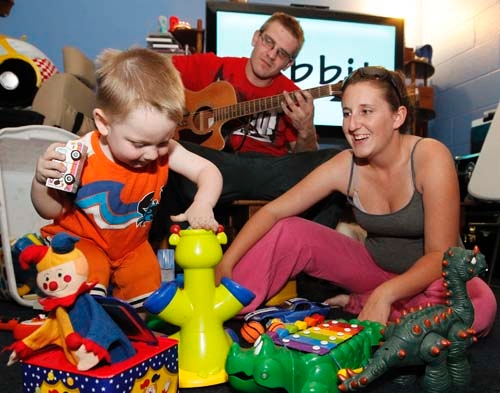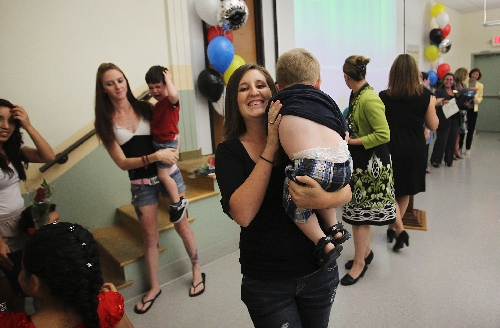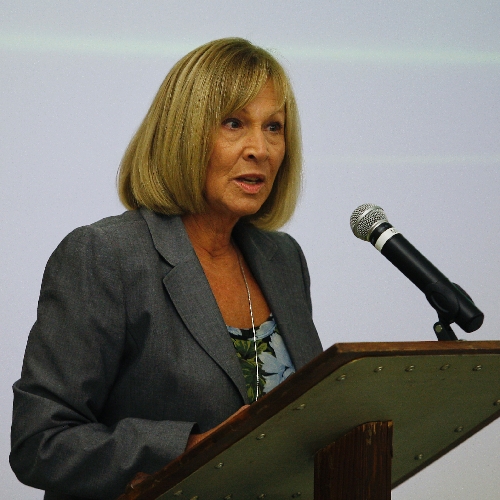Nurses, families create partnerships in valley
The terrible twos have come a month early for little Androo Bradley, who squeals and cries and yells as he struggles to escape his mother's grasp.
Even though Archbishop Roy Lee is using a microphone to deliver the invocation during a public health program at the Southern Nevada Health District, the 23-month-old's shrieking tantrum often drowns him out.
"I knew there was probably going to be trouble when he saw his cousin on the other side of the room," Androo's 19-year-old mother, Marissa Whited, said after the Tuesday program at the health district's headquarters on Shadow Lane. "He loves his cousin. They play together all the time."
How Whited handled the situation -- she calmly gave her son to her boyfriend, who took the child to the less distracting lobby where he quickly cooled down -- impressed the health district's director of nursing, Bonnie Sorenson.
"I was proud that none of our young mothers who were there swatted their children or yelled when they acted up," Sorenson said. "Two-year-olds can be pretty rambunctious. One of the things we teach when it comes to discipline are calming techniques, using creative ways to get children under control, to keep their attention occupied, away from distractions that upset them."
Whited and Androo were two of more than 30 mothers and babies honored Tuesday during the first-ever graduation ceremony for participants in the Nurse-Family Partnership. The program provides low-income first-time parents with a public health nurse who regularly visits the mom from pregnancy until the baby's second birthday.
Though the program is in its infancy in Las Vegas, it already has succeeded in several cities across the country for nearly three decades. Studies in areas as dissimilar as Elmira, N.Y., and Memphis, Tenn., have found that young women and their children in the program are far better off than those from similar backgrounds who don't get the opportunity.
Consider: Child abuse and neglect and emergency room visits for accidents are nearly cut in half, while subsequent pregnancies are reduced by nearly a third. There also is a 67 percent reduction in behavioral and intellectual problems for a child at age 6 and an 83 percent increase in labor force participation by mothers.
"My nurse taught me so much," Whited said. "She helped me realize all the things it takes to be a good mother, and she worked with Androo's father, too. She helped motivate me to go back to school, to get a job. I even learned how to eat right to have a healthy baby."
Prenatal support is the starting point in the program; but after the baby's birth, the nurse continues to deliver parenting and life skills to a vulnerable population -- the median annual income is about $12,500 for teenage mothers in Las Vegas -- where good parenting role models aren't easy to find.
Sorenson said there already is evidence that the program is working in Las Vegas.
"To date, we have had 147 births, and 94 percent of those were carried to full term. That's a huge accomplishment in itself for teen mothers," she said. "You have to remember we're living in a community where nearly a third of the women get late or no prenatal care that is so crucial to delivering a healthy baby."
Across the nation, statistics show teen mothers are more likely than mothers over age 20 to give birth prematurely, before 37 completed weeks of pregnancy. That means their babies face an increased risk of newborn health problems, long-term disabilities and death.
Between 2003 and 2005, pre-term birth rates averaged 14.5 percent for women under age 20 compared to 11.9 percent for women ages 20 to 29, according to the March of Dimes.
A 2006 report by the National Academy of Sciences found that the 550,000 preemies born each year in the United States run up about $26 billion in annual costs, mostly related to care in neonatal intensive care units. That cost is about half of all the money hospitals spend on newborns.
Sorenson said the costly treatment of premature babies born to low-income mothers is part of the reason that the taxpayer-supported University Medical Center lost $70 million last year. Care for just one infant in the critical care unit can easily top $100,000.
Research centered on the program that is now in 32 states has shown that for every public health dollar invested in a Nurse-Family Partnership, communities can realize up to $5 in return. Savings are realized in both health care and welfare program costs.
The program has been so cost-effective across the nation -- in Las Vegas it costs around $450,000 per year for four nurses and a supervisor to work with 147 teen mothers -- that both political parties sing its praises. U.S. Rep. Joe Heck, R-Nev., and U.S. Rep. Shelley Berkley, D-Nev., sent representatives to Tuesday's graduation. So did U.S. Sen. Harry Reid, D-Nev.
Until recently, funds for the local program came out of a multimillion-dollar settlement that Nevada Attorney General Catherine Cortez Masto reached in 2008 as part of an anti-trust law enforcement action that grew out of United Health Group's acquisition of Sierra Health Services.
Of the $15 million charitable contribution that United and Sierra had to make to a number of Nevada agencies, $2 million went to the Southern Nevada Health District. That money has been used for immunizations and the Nurse-Family Partnership.
"Because we see the program as so important, we now fund it through our regular budget, but we're looking for other funding sources as well," Sorenson said. "We already have a waiting list of 76 young women that we'll probably never get to and many more we could help."
Whited said she found out about the program through a friend who was already in it.
"It sounded like it would help give me the support I needed," she said.
As she sat Tuesday night in the crowded Las Vegas home where she lives with Androo, her boyfriend Justin Bradley, and his grandmother and friend, Whited said nurse Maria Teresa Johnson helped her quit smoking.
"She had a video that showed how smoking could hurt the baby," she said. "I didn't realize how it could cause birth defects and premature births."
At first, Johnson showed up once a week armed with advice, videos and information that she would leave in a binder. Practical do's and don'ts were shared, such as what to eat, how to clean the cord after birth, how to breast feed, how to change a diaper, how to discipline. As time went on, visits dropped to every other week and then monthly.
Ninety-nine cent value meals don't give a pregnant mom the vitamins she needs for a heathy baby, Whited remembered Johnson telling her.
"She made me realize how important it was to see a doctor," she said. "I had to see a doctor quite a bit at the end because I'm so small."
Whited is just over 5 feet tall and was about 90 pounds when she became pregnant by Bradley.
"We used protection most of the time," said Whited, who said she was raised by her grandparents much of her life. "I didn't really have a father, but my mother was around for me."
Johnson said she has been impressed with Whited's desire to do the best she can for her baby.
"She came to realize it wouldn't be good for her situation to have another baby very soon, so she got good birth control," Johnson said.
Government statistics show that about one in four teen mothers under 18 have a second baby within two years after their first baby, making it far less likely that they can escape poverty.
Johnson said some of her clients have backgrounds that are particularly tragic. Some were impregnated by stepfathers or their mother's boyfriend. But she said that despite what they have to overcome, the young women in the program try hard to do right by their first babies.
"These young women see this as important and make a commitment," she said. "They have to keep appointments and be responsible for processing a lot of information. And they understand no alcohol or drugs."
Not only women and children are helped by the program. Bradley, Whited's boyfriend, has been impressed with how Johnson involved him in her visits.
"She realizes we're trying to build a good family," he said.
An auto mechanic who often works 12-hour days, Bradley said he is determined to be a good father and work two or three jobs if he has to.
"I was beaten a lot and yelled at as a kid all the time," he said. "That's no way for a kid to be raised. You don't feel good about yourself that way."
Heavily tattooed, the 24-year-old Bradley has had kidney problems requiring surgeries that have left him $300,000 in debt. The family's money challenges forced Whited to take a full-time security job instead of finishing high school.
"I'll do it as soon as I can," she said. "It really bothers me that I had to drop out of school."
Whited said abortion was never an option.
"I love my child and I can't imagine life without him now," she said.
Still, she said she will tell Androo and any other children she might have that it is best not to have children until you are older and in a stable situation where concern over money isn't such a major factor.
"You should finish school and go away to college if you want to, see more things," said Whited, who believes she and Bradley will get married when they can afford the ceremony and honeymoon they desire. "I'm happy now, but I have to be so responsible to care for my child. You don't get to just do fun things the way other young people do."
Contact reporter Paul Harasim at
pharasim@reviewjournal.com or 702-387-2908.






























